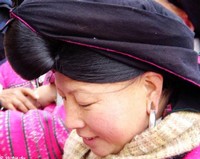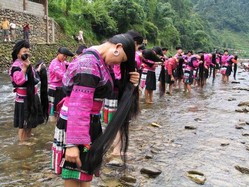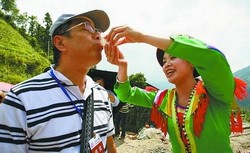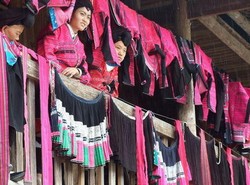Yao People
 Yao nationality is distributed in six provinces but the Guangxi Zhuang Autonomous Region contains the largest population of the Yao people. They have their own language but most would also speak mandarin. Their origins date to the Qin Dynasty. There are several sub-groups within the Yao nationality.
Yao nationality is distributed in six provinces but the Guangxi Zhuang Autonomous Region contains the largest population of the Yao people. They have their own language but most would also speak mandarin. Their origins date to the Qin Dynasty. There are several sub-groups within the Yao nationality.
Yao people are distinctive by their colorful national dress and often the women will have extremely long hair which is coiled up on top of their head.
Costume
Their costume is colorful. In Nandan County of Guangxi, the Yao men wear white bloomers, so they are called ' Baiku Yao'. In Liannan area, Guangdong Province, some of men keep long hair and coiled it up covered with red cloth, several pheasant feather stick in head, which show their handsome pose. The women of yaos are different two, some of them wear short jacket with no collar in upper body, but others are in long coat. In some area three arc silver hairpin is decorated on head, which sometimes weigh half a kilogram.
 Headgear is colorful. No matter men or women like to wrap hair in shape of basin with long black cloth and they think the bigger the beautiful it is. When festival, women will comb hair into a kind shape of tine with colorful handkerchief. Men wrap white coif. Hairstyle is colorful, no matter men or women like to wrap hair into shape of basin with long black cloth. When festival, women will comb hairstyle into the shape of needle and covers with colorful designed handkerchief. A man will tangle a piece of white handkerchief, which is embroidered red and yellow flowery device on both sides and in the middle; the middle device will be on the top and both sides droop on the ears, a triangular earring hung on the left ear.
Headgear is colorful. No matter men or women like to wrap hair in shape of basin with long black cloth and they think the bigger the beautiful it is. When festival, women will comb hair into a kind shape of tine with colorful handkerchief. Men wrap white coif. Hairstyle is colorful, no matter men or women like to wrap hair into shape of basin with long black cloth. When festival, women will comb hairstyle into the shape of needle and covers with colorful designed handkerchief. A man will tangle a piece of white handkerchief, which is embroidered red and yellow flowery device on both sides and in the middle; the middle device will be on the top and both sides droop on the ears, a triangular earring hung on the left ear.
In Longsheng County, women use a kind of special shampoo to wash hair to keep it healthy, the rice stock ash and fermented washing rice water, this kind of natural metrical will keep it smooth and black, so shampoo which made by chemicals can not find in the stores in the past time.
Architecture
Houses are mostly made by bamboo with three rooms: the middle is for a hall, both wing-rooms are for fireplace and bedroom. Some storied building, the upper is for living and the substrate is for livestock. Some of them have a bathroom, and on every night.
Daily Life

The Yaos' are hospitable. HanJingg bags on when enter door is a custom. When a visitor goes into a family, he should put his bag on the wall of the hall, and then the master will invite you to have a meal. If you don't understand that traditional rule, you would be refused and no one will entertain you.
The staple-food is multiplicity. In Guibei area, Dayou Tea prevails, the way of which is to fry tea with oil and salt, it is to mix fried soybean. Someone take it as lunch.
A kind of Guipiao wine is for distinguished guests, which is made from glorious rice. It taste sweet and fine. The more a guest drink, the happier the master will be. Kill domestic animal can not let the visitor know until when it is cooked well. Chicken, meet and salt will be placed in bowls, no matter guests or masters must have all in turn, otherwise it will be thought look down on the masters. After a meal, chopsticks will be hung up with both hands to show respect.
A lot of taboo is in their daily life. In morning, don't speak strange word. A woman who has a baby in thirty-three days will not allowed to carry on water. When parents are dead, children are prohibited to sit on wooden stool and sleeping in beds. For a guest, to praise fat cattle is a disaster. Speak rude before a woman is bad. A hall cannot be in with straw sandals and to be spited.
Festivals
Festival is very much on every month. There are Spring Festival, Kitchen God Festival, Tomb-sweeping Day, Danu Festival, Shuiwang Festival and so on. In Guangxi Zhuang Autonomous Area, Danu Festival is more important, which is said to remember the fight against Tusi. Shuiwang Festival is held on every three or five years on traditional Chinese calendar October 16, it is for young people to fall in love.
Longsheng Red Clothes Festival

Longsheng County is an autonomous county with multi-nationalities. Red Yao is a branch of Yao Nationality in Longsheng. Women of Red Yao are in favor of red clothes, hence the name. Red Clothes Festival, also known as Zhaina, will be held on March 15 in the lunar calender every year for Sishui Town. On occasions of festivals, Red Yao people gather in Sishui Street to exchange agricultural means of productions and products, buy daily necessities, or visit their friends and relatives. The young people will take the chance to find their lovers. Red Yao people are good at singing and dancing. Folk sports such as bamboo pole balancing, tug-of-wars, and rooster fighting, are really interesting. Women of Red Yao have long and nice hairs. They love to match beauties. A beauty in Red Yao criteria must be pretty, knowledgeable, logical in words, singing well and having good moral standard. Zhainais rich in content and programs include singing in antiphonal style, long drum dance, sports contest, hair competition, and Miss Village contest.
With the development of tourist industry, Red Clothes Festival now has become the festival for all nationalities every year. It will be held on March 15 in lunar month, or April 8, at Zhaina (Sishui Village), or at the foot of Longji Mountain.
Long Drum Dance, Yao Nationality
Long Drum Dance is a traditional art form of Yao Nationality. About 2 chi 5 cun ('chi' and 'cun' and ancient Chinese length measurements), Long Drum is made of Yanzhi wood. The drum is thin in the middle with the decorations of flowers, birds, dragons and phoenix patterns on it. Some long drum has bells on both ends and in the middle. When people play the drum, the bells sound harmoniously with the drum sound. It is said that ZaPanKuai was hit to cliff by brutal antelopes. People then began using skin of antelopes to make drum and beat it when dancing to show the hatred to antelopes and the memorization to their ancestors.
Religious
They worship multi-gods and ancestor.
Got questions? Ask us here!
Sally Guo
Travel Advisor